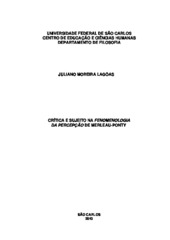| dc.contributor.author | Lagôas, Juliano Moreira | |
| dc.date.accessioned | 2016-06-02T20:13:10Z | |
| dc.date.available | 2010-06-10 | |
| dc.date.available | 2016-06-02T20:13:10Z | |
| dc.date.issued | 2010-02-19 | |
| dc.identifier.citation | LAGÔAS, Juliano Moreira. Crítica e sujeito na fenomenologia da percepção de Merleau-Ponty. 2010. 143 f. Dissertação (Mestrado em Ciências Humanas) - Universidade Federal de São Carlos, São Carlos, 2010. | por |
| dc.identifier.uri | https://repositorio.ufscar.br/handle/ufscar/4853 | |
| dc.description.abstract | The ways by which the modern thought - namely that belonging to the seventeenth and eighteenth centuries - intervenes in the construction of Merleau-Ponty's philosophy, not only illustrates the importance that the french philosopher gives to the theme of history of philosophy, as they are also signatories of the double effort that animates his project: scrutinize the present using the legacy left by the past and to see indistinctly, through the slits and fissures in buildings erected within the modern philosophy, the future tasks of the thought, the challenges with which the philosophical reason will need reckoning. This dissertation aims to make explicit the ways through which this double effort are present in Merleau-Ponty's work, particularly in his doctorate thesis, titled Phenomenology of perception. Our intention is to examine the statute of the critic towards modern reason in a structural problem which, as we will try to show, is a example of the relation between Merleau-Ponty's project and philosophical modernity: the problem of subjectivity. Our hypotheses is that the criticism to modern reason, found in Merleau-Ponty's book - conducts to the acknowledge of the inalienable presence of the world in the horizon of philosophical reason and to the consequent definition of the phenomenon of the perception as a pre-reflexive adhesion of the subject to the world, as a original opening to being - permits Merleau-Ponty to put back the problem of subjectivity in new basis, not anymore those provided by the cartesian paradigm of substantiality, but those that start from experience of the body, from language and from aesthetic expression | eng |
| dc.description.sponsorship | Universidade Federal de Minas Gerais | |
| dc.format | application/pdf | por |
| dc.language | | |
| dc.publisher | Universidade Federal de São Carlos | por |
| dc.rights | Acesso Aberto | por |
| dc.subject | Fenomenologia | |
| dc.subject | Merleau-Ponty, Maurice, 1908-1961 | |
| dc.subject | Crítica da modernidade | |
| dc.subject | Ontologia | |
| dc.subject | Subjetividade | |
| dc.subject | Expressão | |
| dc.subject | Sujeito | |
| dc.subject | Percepção | |
| dc.subject | Merleau-Ponty | eng |
| dc.subject | Maurice | eng |
| dc.subject | Phenomenology | eng |
| dc.subject | Subjectivity | eng |
| dc.subject | Perception | eng |
| dc.subject | Critic | eng |
| dc.title | Crítica e sujeito na fenomenologia da percepção de Merleau-Ponty | |
| dc.type | Dissertação | por |
| dc.contributor.advisor1 | Pinto, Débora Cristina Morato | |
| dc.contributor.advisor1Lattes | http://lattes.cnpq.br/1311151012002541 | por |
| dc.description.resumo | As maneiras pelas quais o pensamento moderno leia-se, aquele dos séculos XVII e XVIII - intervém na construção da filosofia merleau-pontiana, não apenas ilustram a importância que o fenomenólogo francês atribui ao tema da história da filosofia, como também são signatárias do duplo esforço que anima o seu projeto: o de escrutinar o presente à luz dos legados deixados pelo passado e o de tentar entrever, pelas frestas e rachaduras dos edifícios erigidos no seio da filosofia moderna, as tarefas vindouras do pensamento, os desafios com os quais a razão filosófica precisará ajustar contas. Esta dissertação tem como objetivo explicitar os modos através dos quais esse duplo esforço se apresenta na obra de Merleau-Ponty, particularmente em sua tese de doutoramento, intitulada Fenomenologia da percepção. Nossa pretensão é examinar o estatuto da crítica à razão moderna na estruturação de um problema que, tal como tentaremos mostrar, é exemplar da relação entre o projeto merleau-pontiano e a modernidade filosófica: o problema da subjetividade. Nossa hipótese é a de que a crítica à razão moderna na Fenomenologia da percepção, conduzindo ao reconhecimento da presença inalienável do mundo no horizonte da reflexão filosófica e à consequente definição do fenômeno da percepção como adesão pré-reflexiva do sujeito ao mundo, como abertura originária ao ser, permite a Merleau-Ponty recolocar o problema da subjetividade sobre novas bases, não mais aquelas fornecidas pelo paradigma cartesiano da substancialidade, mas as da experiência do corpo, da linguagem e da expressão estética. | |
| dc.publisher.country | BR | por |
| dc.publisher.initials | UFSCar | por |
| dc.publisher.program | Programa de Pós-Graduação em Filosofia - PPGFil | por |
| dc.subject.cnpq | CIENCIAS HUMANAS::FILOSOFIA | por |
| dc.contributor.authorlattes | http://lattes.cnpq.br/5987952279333424 | por |
